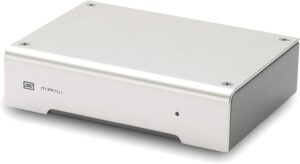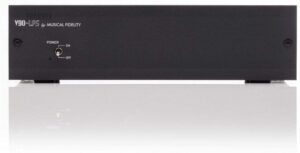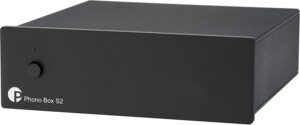What is the best preamp for Pro-Ject Debut Carbon? We will help you find all the essential information about four superb preamplifiers to pair with the Debut Carbon (DC) turntable.

Costing under $400, Pro-Ject Debut Carbon is undoubtedly one of the most affordable audiophile-grade TTs offering excellent value for money. That Pro-Ject Debut Carbon (unlike most turntables) doesn’t come equipped with a built-in phono preamp is a blessing in disguise.
Selecting a quality preamp to sync with your TT rig offers you the leeway to personalize and upgrade cartridges and related accessories without changing the whole turntable.
Pro-Ject Debut Carbon includes comparatively low-capacitance, gold-plated RCA cables, and a ground wire to mate the turntable with the preamp. So take your pick from Cambridge Audio Alva Duo, Schiit Mani, Musical Fidelity, and Pro-Ject’s own Phono Box S2 for pairing with your Pro-Ject Debut Carbon. But, first, let’s take a closer look at those exciting preamplifiers.
The 4 Best Preamplifiers for Pro-Ject Debut Carbon
| Image | Model | Price |
|---|---|---|
 | Schiit Mani Phono Preamp (Top Pick) | Check Price |
 | Musical Fidelity V90-LPS Preamp (Close Runner-Up) | Check Price |
 | Cambridge Audio Alva Duo Preamp | Check Price |
 | Pro-Ject Phono Box S2 Preamp | Check Price |
Schiit Mani Phono Preamp (Editor’s Choice)
The Mani Phono Preamp from Schiit raises the bar for contemporary and vintage phono preamplifiers and redefines what a preamp stands for. The Schiit Mani Phono Preamp lets you connect the device to a moving-coil- or moving-magnet turntable for unparalleled performance. Most of the standard, inexpensive phono preamps out there are suitable, by and large, for pairing with moving-magnet cartridge turntables.
Most low-priced phono preamplifiers lack the gain essential for driving MC or the versatility for powering high-output MM/MC TTs. However, the Mani preamp always stays ahead of the competition as it features four switchable gain modes making it companionable with virtually any phono cartridge. In addition, this Schiit’s phono preamp’s reinforced with an accurate and quietly passive RIAA equalization network helps boost sonic quality and minimizes groove degradation, which usually arises during playback.
The RIAA network works in tandem with ultra-low noise gain, 0.5% thin-film resistors, and 2% film capacitors for exceptional performance. All the components constituting the Mani phono preamp from the chassis to the transformers (except wall adapters) have been designed and crafted in the US. Every Schiit Mani phono preamp comes with a limited 2-year warranty covering labor and components so enjoy peace of mind for a couple of years.
Priced at about under $150, the Mani preamp targets the budget-conscious audiophile looking to try out this novel format called vinyl. A super compact phono preamp weighing about 450g, this silvery and rock-solid mini-amp works perfectly with MC and MM cartridges. You can easily access the four switchable gain modes (30dB, 42dB, 47dB, and 59dB) through a bunch of embedded switches underneath the preamp’s bodywork.
Overall, the Mani preamp by Schiit guarantees a considerably open soundstage that is well-balanced with upper-midrange focus, clean high-ends, and well-defined bass.
Pros
- Amazingly quiet passive and accurate RIAA equalization network
- Four exchangeable or transposable gain levels for connecting any MM/MC/high-output cartridge vinyl player
- Thoroughly designed and assembled in the US
Cons
- The powering light is a tad too glaring
- The gain switches are somewhat fiddly
Musical Fidelity V90-LPS (Close Runner-Up)
The Musical Fidelity V90-LPS is a performance-driven phono preamp that is supremely compatible with almost all MM/MC turntables and is affordable. This phono preamp performs excellently in all the five crucial areas of the phono stage, including superior overload margin, low noise, low distortion, improvement beyond 20 kHz, and RIAA correction. Talking about the V90-LPS, this preamp excels in precise RIAA correction going up to 80 kHz and above.
Such an extreme level of accuracy is needed for rectifying or correcting plenty of information over and above 20 kHz. In case the rectification is not carried out effectively, the shortcoming will show up in the form of overshoot and ringing. The distortion of V90-LPS is remarkably low as well as the noise ratio is relatively low. The margin of overload is more than adequate for any modern-day or vintage vinyl player.
A high-quality phono stage, the V90-LPS has been painstakingly engineered to serve as the perfect linkage between Hi-Fi amps and performance-oriented turntables. In addition, this phono preamp’s signal has been specially designed to furnish a crystal clear and clean interface for music. So at the end of the day, you get to enjoy your favorite numbers and movies precisely in the way you wish.
Since the power supply mechanism lies outside the core unit, chances of interference from the mains adversely affecting the circuitry are minimal. Though the V90-LPS preamp is very budget-friendly, the unit does not compromise on the quality of electronics used in the circuitry. Consequently, audiophiles make the most of top-quality sound reproduced by this Musical Fidelity preamp at a competitive price.
Pros
- Externalized power supply for minimal mains interference and less noise
- Works with moving coil as well as moving magnet phono cartridges
- Ground connection point for vinyl players
- Highly accurate RIAA network extending up to nothing less than 60 kHz
- Rock-solid build quality
Cons
- Every time you flip the power switch, there’s a noticeable pop
Cambridge Audio Alva Duo
You bet you’ll pick up every subtle note from your vinyl- or gramophone disc record collection when you insert the Cambridge Audio Alva Duo in your stereo rig. This is because the Alva Duo phono preamp features a built-in headphone amp that pairs seamlessly with nearly any moving-magnet or moving-coil cartridge. As a result, there’s something vintage and nostalgic about vinyl- or gramophone-record players of yore.
If you’re a hardcore music enthusiast, having listened to music on a turntable, then clear the dust from the vinyl disc’s sleeve for reminiscing about the bygone era. – to be continued. You’ll fall in love with the Audio Alva Duo the moment your eyes fall on it. An advanced SMPS (switch-mode power supply) and circuit boards featuring surface-mounted components are sitting pretty under the hood of the sleek silvery framework.
You’ll benefit from those design tweaks and fine-tunings when your tympanums hear only immersive sounds without any noise or distortion. In addition, the Alva Duo is directly incorporated with a 6.35mm headphone output for seamlessly accepting the jack cable of your headphones. So if you wish to take pleasure in tuning in to your favorite numbers in private, all you need to do is plug in the jack from your headphones.
The inbuilt headphone output relieves you from the need to power your amp for turning on headphones, thus letting you save energy. A standard preamp takes a turntable’s low-level signals and boosts them sufficiently so that Hi-Fi amps can comfortably deal with it. However, this convenience comes at a price –though the preamp boosts up the low-level signals of turntables, the processing causes unwarranted distortion and noise.
The integrated SMPS and the all-new circuit board work to keep noise and hum to a minimum.
Pros
- The intuitive surface-mounted circuit board and cutting-edge SMPS technology guarantees a spectacular musical experience from vinyl disc records
- Features an exclusive built-in 6.35mm headphone jack that enables enjoying music in private without powering your amp
- Subsonic filter and balance control help get rid of low-frequency reverbs and grumble resulting from playing old, worn-out vinyl
- This phono stage ensures shorter signal paths for a swifter pinpointed response with minimal background noise and irritating buzz
- The Duo consumes less than ½ watt during standby mode and switches off automatically if unused continuously for 20 minutes
Cons
- Many listeners have reported an irritating, persistent hum despite being reinforced with subsonic filters
- The incorporated output for headphones is practically a dud: poor quality of reproduced sound on headphone
Pro-Ject Phono Box S2
The Pro-Ject Phono Box S2 immaculately delivers top-notch analog sound thanks to the unit’s premium circuitry yet is supremely affordable. The Phono Box S2 phono preamp from Pro-Ject has everything going for it, rendering the unit perfectly companionable with MM/MC – or high-output turntable. This is one top-quality phono preamp that comes with an array of functional features that you can exploit fully.
The dual-mono Phono Box S2 (duplication of the same audio signal in left and right channels) is armed with polypropylene WIMA capacitors and top-grade amp components. These design upgrades guarantee that you listen to every note and tune belted by your vinyl record discs collection in detail. In addition, this preamp is securely enclosed in aluminum/metal cabinetry for protection from excessive resonance and exasperating electromagnetic interference.
Whatever phono cartridge you have, you’re assured of steady customizable control thanks to switchable input impedance/capacitance, changeable subsonic filter, and accurate RIAA equalization that support four distinct modifiable gain levels.
In addition, the manual included with the Box S2 features simple clear-cut diagrams demonstrating the modus-operandi of setting the dip switches for your turntable, thereby enabling a hassle-free upgrade.
Pros
- Audiophile-quality polypropylene WIMA capacitors for shortening signal path
- Perfectly companionable with moving coil and moving magnet cartridges
- Four discrete gain modes for matching up with output levels of gramophone cartridges
- Heavy-duty aluminum/metal bodywork
- Dual-mono circuit board for facilitating channel separation
- External power supply for bringing down electromagnetic interference
- Compact design for positioning close to the turntable
Cons
- No clear labeling of “bank A” or “bank B” for helping with trouble-free setup
FAQ: Why Do I Need a Preamp for My Turntable?
If your turntable comes with a built-in preamp, you can do without a separate preamp to connect the vinyl player to speakers.
Alternatively, if the gramophone doesn’t have an integrated preamp, you’ll invariably require an external phono preamplifier. The internal phono preamps are often referred to as the phono stage, so there’s a lot of overlap between the two.
Nevertheless, a ‘preamp’ means any standard preamplifier regardless of whether it is external or built-in. Phono stages, on the other hand, are usually referred to as built-in or incorporated preamps. So now, how do you figure out if your vinyl player comes equipped with an integrated phono preamp?
And in case your record player has one, how do you determine if the same is efficient.
Finding Out If Your Record Player Has a Preamp
The most practical to determine whether your gramophone comes with a built-in preamp is by pairing it with your speakers. Once you’re done with hooking up, play a vinyl (disc) record, and if you can hear the tunes even at reasonable volume levels, then your unit has a preamp. On the other hand, if you can hear the songs with good clarity minus any noticeable distortion even when you increase the volume, then the built-in preamp is of excellent quality.
The Pro-Ject Debut Carbon vinyl player does not feature an incorporated phono preamp which implies that you’ll have to choose an ext preamp for connecting the TT to speakers.
The Function of a Phono Preamp
At its most basic, the preamp inside a turntable boosts up or rather amplifies the vinyl player’s low-level signals so that they can be intercepted and configured by an amp for transmitting to an audio source. If your record player doesn’t have a phone preamp, you won’t be able to connect the turntable directly to an external amplifier. The phono stage or phono preamp serves as the via media for establishing a connection between your TT and amp. Besides amplifying the audio signal, a preamp also aids in applying RIAA equalization to the signal for boosting sonic quality.
The RIAA equalization curve also guarantees that the delivery of sound remains consistent before and after amplification. Unlike all other components in your gramophone chain, the preamp is a specialized add-on that helps in allowing your phono audio rig to perform efficiently and smoothly. The phono amp appends gain to your turntable’s output so that the signal is amplified to a level high enough to be capitalized by the amplifier.
The audio signal generated by the turntable is processed into an electrical signal for use by the cartridge’s stylus. This output (4mV) falls far short of powering an external amp. An entry-level amp is, for the most part, capable of amplifying the audio signal of your turntable to an output of 300mV.
This (volume or level) of output is just adequate for use by an amplifier.
So, the Best Preamp for the Debut Carbon (DC) Turntable Is…
Since all the preamps reviewed in this article are good enough to be paired with the Pro-Ject Debut Carbon, picking out the best of the best is a challenging task. Both the Musical Fidelity and Cambridge models run neck-to-neck for the top slot.
While the V90-LPS features RIAA equalization that gives the unit a slight edge over the Alva Duo, the latter comes with power-saving features that make it equally sought-after.
However, our champion overall is the Mani preamp by Schiit. It’s the best preamplifier for Pro-Ject Debut Carbon you can find on the market at the moment.